Camembert/Brie
Camembert
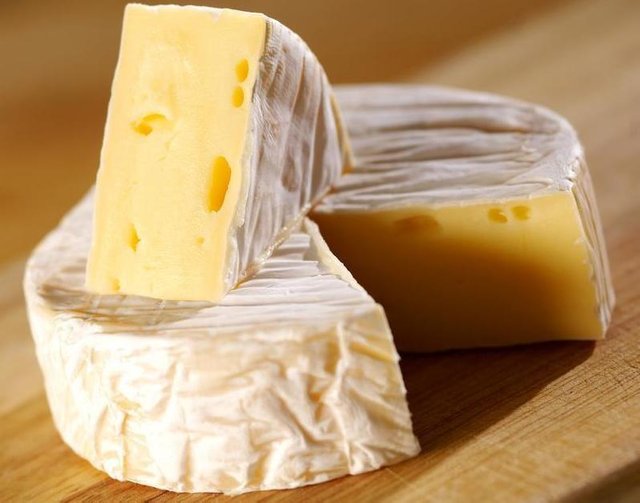
Is a soft, creamy, surface-ripened cow's milk cheese. It was first made in the late 18th century at Camembert, Normandy, in northern France.
The first camembert was made from unpasteurized milk, and the AOC variety "Camembert de Normandie" is required by law to be made only with unpasteurized milk. Many modern cheesemakers use pasteurized milk for reasons of safety.
The true Camembert cheese of Normandy made with unpasteurized milk.
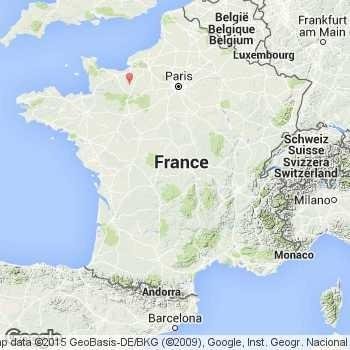
The cheese is made by inoculating warmed cow milk with mesophilic bacteria, then adding rennet and allowing the mixture to coagulate. The curd is then cut into roughly 1 cm (1/2 inch) cubes, salted, and transferred to low cylindrical camembert molds. The molds are turned every six to twelve hours to allow the whey to drain evenly from the cut curds; after 48 hours, each mold contains a flat, cylindrical, solid cheese mass weighing generally 250 grams. At this point the fresh cheese is hard, crumbly and bland.
The surface of each cheese is then sprayed with an aqueous suspension of the mold Penicillium camemberti, and the cheeses are left to ripen for a legally required minimum of three weeks.
This affinage produces the distinctive bloomy, edible rind and creamy interior texture characteristic of the cheese. Once the cheeses are sufficiently ripe, they are wrapped in paper and may be placed in wooden boxes for transport.
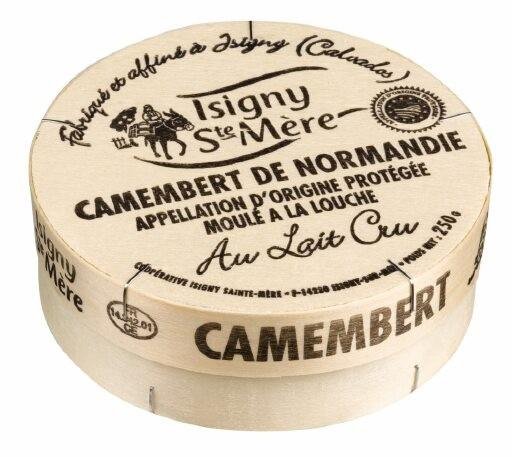
History
Camembert was reputedly first made in 1791 by a farmer from Normandy, following advice from a priest who came from Brie.
In 1890, an engineer devised the wooden box that was used to carry the cheese and helped to send it for longer distances, in particular to America, where it became very popular. These boxes are still used today.
Before fungi were understood, the color of camembert rind was a matter of chance, most commonly blue-grey, with brown spots. From the early 20th century onwards, the rind has been more commonly pure white, but it was not until the mid-1970s that pure white became standard.
The cheese was famously issued to French troops during World War I, becoming firmly fixed in French popular culture as a result. It has many other roles in French culture, literature, and history. It is now internationally known, and many local varieties are made around the world.
The variety named Camembert de Normandie was granted a protected designation of origin in 1992 after the original AOC in 1983. The AOC Camembert can only be made from raw, unpasteurized milk from vaches normandes cows. Problems with hygiene regulations have caused restrictions on importation and sale in some countries, notably the US.
Brie
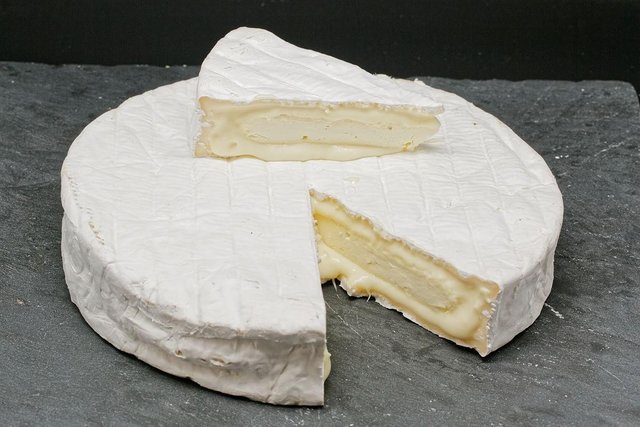
Brie cheese is a similar soft cheese, also made from cow's milk. However, there are differences such as its origin, typical market shape, size, and flavor.
Brie originates from the Île de France while camembert comes from Normandy. Traditionally, brie was produced in large wheels, either 22.9 cm (9 in) or 36.8 cm (14.5 in) in diameter, and thus ripened more slowly than the smaller camembert cheeses. When sold, brie segments typically have been cut from the larger wheels and therefore its sides are not covered by the rind.
By contrast, camembert is ripened as a small round cheese 10.2 cm (4 in) in diameter by 3.2 cm (1.26 in) thick and fully covered by rind.
This ratio change between rind and paste makes camembert slightly stronger when compared to a brie ripened for the same amount of time.
Once the rind is cut on camembert it typically has a more pungent aroma than brie. In terms of taste, camembert has a stronger, slightly sour, and sometimes chalky taste. The texture of camembert is softer than brie, and if warmed camembert will become creamier, whereas brie warms without losing as much structure.
Typically camembert tends to be sold whole in thin, round, wooden containers made from poplar.
Poplar
Poplar or Populus is a genus of 25–35 species of deciduous flowering plants in the family Salicaceae, native to most of the Northern Hemisphere.
Packaging
Modern variations in packaging include cartons and tin cans, with a ring-pull tab for opening but Camembert in metallic boxes does not exist on the French market.
The cardboard boxes are reserved for the low-cost camemberts. The product is the same as in the wooden container, wrapped dry in a paper/foil wrapper, and not immersed in brine or oil.

Pack a Camembert box in aluminum and then put them in the still hot embers of the barbecue. You leave it for about 10-15 minutes and then enjoy!
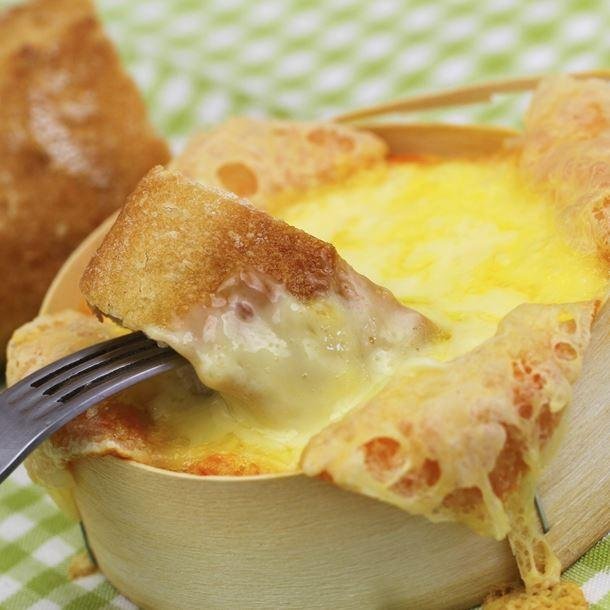

If you go to France someday know that
a well-known expression in France to say you shut up is shut your Camembert box
我不管,我就要中文留言,哈哈哈哈😄
Downvoting a post can decrease pending rewards and make it less visible. Common reasons:
Submit
hi dear steemit iam a new member in steemit i will be happy that you see my blog and share your idea and sujjestion how to inprove my blog
thank for your support
Downvoting a post can decrease pending rewards and make it less visible. Common reasons:
Submit
food looks so delicious,,,,,,,
thanks for sharing @lndesta120282......////////
Downvoting a post can decrease pending rewards and make it less visible. Common reasons:
Submit
verry lovely food Camembert...Camembert history is verry good history...thanks for sharing @lndesta120282
Downvoting a post can decrease pending rewards and make it less visible. Common reasons:
Submit
wow, yummy yummy and tasty. Thanks for sharing such a tasty Camembert/Brie and its history!
Always your post is very informative. Thank s for sharing such a delicious and healthy food @indesta120282.
Downvoting a post can decrease pending rewards and make it less visible. Common reasons:
Submit
It is interesting that the cheeses developed almost by historical chance more than anything else. Very interesting indeed.
Downvoting a post can decrease pending rewards and make it less visible. Common reasons:
Submit
Bro again post net connection problem
Downvoting a post can decrease pending rewards and make it less visible. Common reasons:
Submit
AJ picked your post @lndesta120282 for his #TOP5 FOOD POST. Visit AJ's FOOD ROUNDUP to view where your post is ranked.

Downvoting a post can decrease pending rewards and make it less visible. Common reasons:
Submit
Delicious
Downvoting a post can decrease pending rewards and make it less visible. Common reasons:
Submit
I must try this :)
Downvoting a post can decrease pending rewards and make it less visible. Common reasons:
Submit
I simply love your articles, what great content and quality of posting you offer the community here on Steemit and abroad.
Thanks a lot :)
Downvoting a post can decrease pending rewards and make it less visible. Common reasons:
Submit
Wow, Camembert Is a soft, creamy, surface-ripened cow's milk cheese. It was first made in the late 18th century at Camembert, Normandy, in northern France.Thanks for sharing.
Downvoting a post can decrease pending rewards and make it less visible. Common reasons:
Submit
great. thanks for information about it . i like it
Downvoting a post can decrease pending rewards and make it less visible. Common reasons:
Submit
l think very testy food @lndesta120282
Downvoting a post can decrease pending rewards and make it less visible. Common reasons:
Submit
wish i have those hands & keep upvoting such as this creative funny post!!
Thanks for sharing this..
Downvoting a post can decrease pending rewards and make it less visible. Common reasons:
Submit
i like Camembert...so sweet food..this history is relly owesome..thanks @lndesta120282
Downvoting a post can decrease pending rewards and make it less visible. Common reasons:
Submit
food looks so tasty,,,
Downvoting a post can decrease pending rewards and make it less visible. Common reasons:
Submit